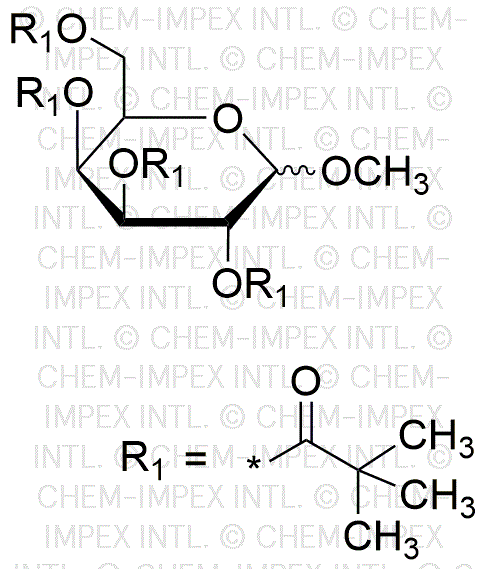Methyl 2,3,4,6-tetra-O-pivaloyl-D-mannopyranoside is widely utilized in research focused on:
- Glycosylation Reactions: This compound serves as a glycosyl donor in synthetic chemistry, facilitating the formation of glycosidic bonds in carbohydrate synthesis, which is essential for producing complex carbohydrates and glycoproteins.
- Drug Development: It plays a role in the development of carbohydrate-based drugs, enhancing the bioavailability and stability of therapeutic agents, particularly in the field of oncology and infectious diseases.
- Bioconjugation: This chemical is used in bioconjugation processes, allowing researchers to attach biomolecules to surfaces or other molecules, which is crucial for creating targeted drug delivery systems.
- Analytical Chemistry: It is employed as a standard in analytical techniques, helping to identify and quantify carbohydrates in various samples, which is vital for quality control in food and pharmaceutical industries.
- Research in Glycobiology: The compound aids in the study of carbohydrate interactions in biological systems, providing insights into cell signaling and immune responses, which are important for understanding diseases and developing new therapies.
General Information
Properties
Safety and Regulations
Applications
Methyl 2,3,4,6-tetra-O-pivaloyl-D-mannopyranoside is widely utilized in research focused on:
- Glycosylation Reactions: This compound serves as a glycosyl donor in synthetic chemistry, facilitating the formation of glycosidic bonds in carbohydrate synthesis, which is essential for producing complex carbohydrates and glycoproteins.
- Drug Development: It plays a role in the development of carbohydrate-based drugs, enhancing the bioavailability and stability of therapeutic agents, particularly in the field of oncology and infectious diseases.
- Bioconjugation: This chemical is used in bioconjugation processes, allowing researchers to attach biomolecules to surfaces or other molecules, which is crucial for creating targeted drug delivery systems.
- Analytical Chemistry: It is employed as a standard in analytical techniques, helping to identify and quantify carbohydrates in various samples, which is vital for quality control in food and pharmaceutical industries.
- Research in Glycobiology: The compound aids in the study of carbohydrate interactions in biological systems, providing insights into cell signaling and immune responses, which are important for understanding diseases and developing new therapies.
Documents
Safety Data Sheets (SDS)
The SDS provides comprehensive safety information on handling, storage, and disposal of the product.
Product Specification (PS)
The PS provides a comprehensive breakdown of the product’s properties, including chemical composition, physical state, purity, and storage requirements. It also details acceptable quality ranges and the product's intended applications.
Certificates of Analysis (COA)
Search for Certificates of Analysis (COA) by entering the products Lot Number. Lot and Batch Numbers can be found on a product’s label following the words ‘Lot’ or ‘Batch’.
*Catalog Number
*Lot Number
Certificates Of Origin (COO)
This COO confirms the country where the product was manufactured, and also details the materials and components used in it and whether it is derived from natural, synthetic, or other specific sources. This certificate may be required for customs, trade, and regulatory compliance.
*Catalog Number
*Lot Number
Safety Data Sheets (SDS)
The SDS provides comprehensive safety information on handling, storage, and disposal of the product.
DownloadProduct Specification (PS)
The PS provides a comprehensive breakdown of the product’s properties, including chemical composition, physical state, purity, and storage requirements. It also details acceptable quality ranges and the product's intended applications.
DownloadCertificates of Analysis (COA)
Search for Certificates of Analysis (COA) by entering the products Lot Number. Lot and Batch Numbers can be found on a product’s label following the words ‘Lot’ or ‘Batch’.
*Catalog Number
*Lot Number
Certificates Of Origin (COO)
This COO confirms the country where the product was manufactured, and also details the materials and components used in it and whether it is derived from natural, synthetic, or other specific sources. This certificate may be required for customs, trade, and regulatory compliance.


